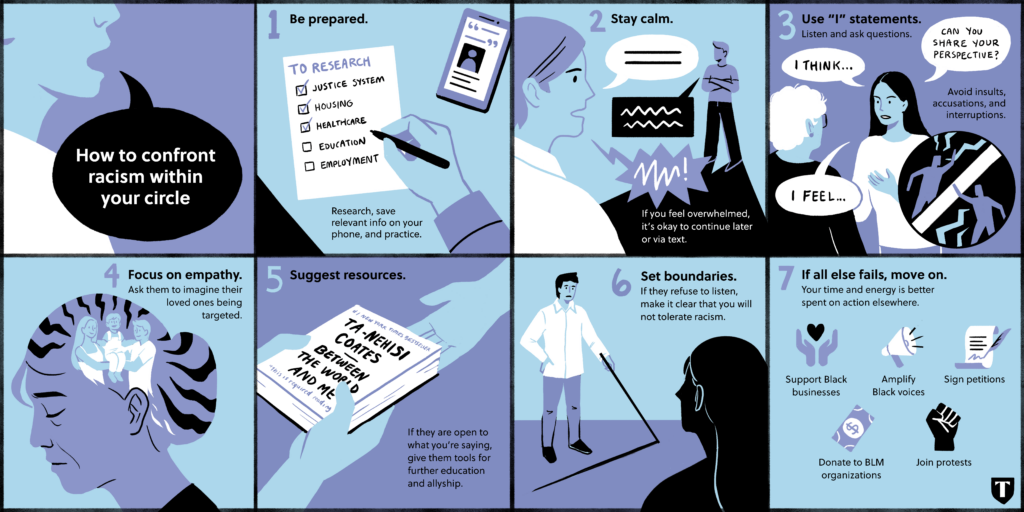How to confront racism within your circle
Lately we’ve been more silent on social media and this blog out of respect. And as a small, not-so-diverse company we have been hesitant to take up space in the current conversation. People are making their voices heard in the streets around the country and the world, and we respect, support, and honor that. But online silence is not a solution, even if offline we’ve been having difficult conversations about racism, discrimination, privilege, and police violence with our kids, our families, our friends.
Hard times aren’t helped by empty gestures, so we’re offering some clear and direct tips to help non-Black people confront and discuss racism and what’s been going on. Maybe this can help others have those uncomfortable conversations too. It’s a necessary act just as valuable as voting, protesting, signing petitions, supporting Black businesses, donating to anti-racist causes and community groups—and growing to become a more diverse company.
Tremendousness has directed donations to support Black Lives Matter and other much-needed organizations, including Arch City Defenders, Action St. Louis, Equal Justice Initiative, Helping Hand Black Small Business Relief, and bail-out funds. If you too can support groups doing good, then scroll down to see these and other places to donate. Or at the very least, use the tips below to start a difficult conversation.
Because Black Lives Matter.
How to confront racism within your circle
- Be prepared. Research important topics like racial profiling, housing, and education, and verse yourself in the history of Black people and racism in America. Save relevant information on your phone, and practice what you’re going to say.
- Stay calm as you speak with your family member or friend. If you feel overwhelmed by emotion at any point, it’s okay to continue the conversation later or via text.
- Use “I” statements throughout the conversation. “I am hurt because…”, “I feel angry that…”, “I really want to understand why you…” Avoid insults, accusations, and interruptions. Listen and ask questions about the other person’s position.
- Focus on empathy. Ask the other person to picture themself as the victim of racism, or imagine their loved ones being targeted.
- If the other person is open to what you’re saying, suggest resources for further learning and allyship (scroll down for some suggestions!).
- If they’re refusing to listen, set firm boundaries. Be clear that you will not tolerate racism.
- If all else fails, move on. Your time and energy is better spent on action elsewhere. Support Black businesses, amplify Black voices, protest, petition, donate—there are many ways to use our privilege.
Further learning
- An expansive list of resources related to the Black Lives Matter movement
- How White Parents Can Talk To Their Kids About Race
- Bryan Stevenson on the Frustration Behind the George Floyd Protests
- Here’s What to Say to Racist Family Members During the Holidays
- How to be an Antiracist
- White Fragility: Why It’s So Hard for White People to Talk About Racism
- The Warmth of Other Suns: The Epic Story of America’s Great Migration
- The Broken Heart of America: St. Louis and the Violent History of the United States
- Between the World and Me
Places to donate
- Black Lives Matter
- Arch City Defenders
- Action St. Louis
- Equal Justice Initiative
- Helping Hand Black Small Business Relief
- National Bail Out
- Others can be found at Donate for Black America
Sources
https://www.insider.com/how-to-talk-to-non-black-family-race-therapist-tips-2020-6
https://www.amnesty.org.au/tell-someone-love-theyre-racist/
https://www.tolerance.org/magazine/publications/speak-up/among-family
Illustrations by Christina Wang. Maddy Mueller, Christina Wang, and Bill Keaggy contributed to this post.
